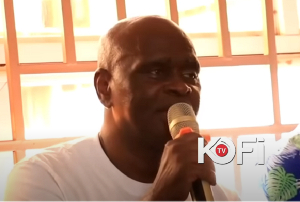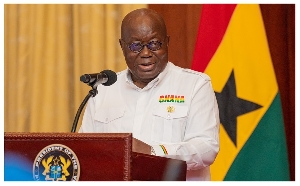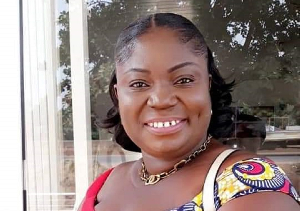- Home - News
- TWI News | TV
- Polls
- Year In Review
- News Archive
- Crime & Punishment
- Politics
- Regional
- Editorial
- Health
- Ghanaians Abroad
- Tabloid
- Africa
- Religion
- Election 2020
- Coronavirus
- News Videos | TV
- Photo Archives
- News Headlines
- Press Release
Opinions of Tuesday, 5 August 2008
Columnist: Konongo Fordjour
Democratic Ghana in Authoritative Africa
Part 3: Diplomacy and Governance - Outsourcing in Subcontracts Written by Konongo Fordjour
Contemporary developments in our African political arena require serious debate. For instance, one area of significance in African security is poverty. Human rights abuses are interconnected with poverty and ignorance. It is a fact that oppressed nations have direct proportionality to poverty and its resultant heinous atrocities self-inflicted on themselves as a result of their wealth being stolen from them by other nations such as Europeans, etc. through slavery, partitioning and colonialism; and modern day demoralization of Africa by the demoralized Chinese.There are so many ways of solving such labyrinth man-made problems. One possible effective method never considered before could be a human political engineering through the exchange of executive presidential governance completely different from colonialism and/or imperialism. This means seeking most influential personalities with the best administrative skills and identifiable with a poor state out there to assist leadership in that country. For instance, outsourcing an African-American, e.g. Secretary of State Dr. Condoleezza Rice, Illinois Senator Dr. Barrack Obama, or Massachusetts Governor Deval Patrick to become head of an African country, say Kenya, Burkina Faso or Chad; or Kansas Senator Sam Brownback to administer say Sudan or Congo within the period constitutionally permitted by that country.
Initial observation of the statement poses a mammoth task, but if CEOs and corporate presidents can be hired from any part of the world to handle some strategic areas of business or a country for that matter, then executive presidential seats can be outsourced easily across the globe. All it takes is a skillful diplomat with political acumen and supported by indigenous meritocrats to turn a hopeless case around to a globally-accepted leadership performance.
That would trigger a new era of a world of intergovernmental networking; a world free from crimes, wars, racial tensions, historic bitterness, and jettison the superiority-inferiority conundrums. Did someone mention that individual persons mainly from Britain, France, Germany, and the USA, operate our separatist states from remote? Yes, they control our budget, our crude oil, diamond, uranium, gold, cocoa, etc. and yes, they can easily twist us around if we dare disagree with their orders. Talk about gold. One thing that this author knows is that gold is not refined in Ghana; it is done in the USA. Ghana’s bauxite and manganese are also refined in Kingston-Jamaica. If areas of national treasure are wholly controlled and manipulated by people we do not know, then what is the problem with recruiting experts to run our countries while we learn from them, more especially if those personalities are Afro-centric ones?
The reality of ‘global village’ and the principle of “comity of nations†are feasible with a little bit of strategic thinking. Our difficulty of doing this emanates from crimes, thefts, cheats, disrespect, etc. previously committed by the evil of atrocities, slavery and colonialism. The way forward is a collective beginning of the indigenous holding hands with the rich and the experienced in an effort to build a peaceful world. In a recent article by this same author, a team of six eminent personalities for African advancement, EPAD, was suggested as one other most important strategy in line with Africa’s total emancipation. Human political engineering along with EPAD will generate the influence needed to organize men and women to heal our “world of leadership decadenceâ€.
An interesting development in West Africa where sixteen nations have signed up into an economic and monetary unification has potentiality of federated governance in the near future. There is an underlying proposition of “governement san frontiers†(government without borders) brewing in the West African sub-region. While nations are tearing themselves apart in the midst of oil money and terrorism elsewhere, poor West Africans are slowly weaning themselves from belligerence and tyranny into economic superiority. The role academics and professionals from the USA can play is to team up with resident West Africans, survivors of West African slaves, sympathizers, sponsors and investors to create a lineage that will alter the colonial demise into a modern system broad enough to accommodate slaves and “identifiers†that will see the human political engineering feasible.
There is the USA policy on global order in economic and political democratization, for instance, which forces foreign governments to fight poverty and improve on democratic process in their own countries through the millennium challenge account policy, in itself, demands skilled regional personnel to confront issues squarely and deal with conflicts as they materialize. The US policy seems to recognize the fact that conflicts - internal or external - are inevitable because man is the causative agent to his own demise. Therefore in effect, wars are themselves necessary because where there is war, peace is bound to follow, and vice versa. The EPAD and the human political engineering strategies will cushion the related shocks that come with advancement. The USA has gone through a similar problem of our kind before. Therefore, seeking our own to offer their free contributions build hot spots in Africa will not hurt anything.
The current Ghana Government particularly deserves praise for its brilliant performance over the period it has been on the helms of affairs. Our Government has politely shouldered off the western dangerous pressure of condemning fellow governments across the continent. Initially, it was the Zimbabwe’s Mugabe, then directed to Sudan’s Al Bashir over the Darfur crisis. Our Vice President’s recent joint statement with the AU to refuse to push President Bashir to the International Criminal Court (ICC) is another positive direction treaded by our first gentlemen in the country. Good job, Your Excellencies. We have to move forward with one voice and win honourably. Honestly, the Darfur situation is absolutely sad. It is this kind of shame that the late Dr. John Galang of Southern Sudan’s Sudanese Peoples’ Liberation Movement (SPLM) - with Army - (SPLA) fought during the time he spent on this earth.
Dr. Galang could not receive help from anywhere; he was despised, maimed, ostracized, and given all sorts of names. Today, John has been remembered dearly for one single thing that he stood for, a federated Sudan. As a black Bantu from the south, John was almost always referred to as a “kefir†- a heathen, an unclean black carcass - simply to denigrate the noble man by tribesmen of the very same “stand-aside-and-do-nothing†Darfur. As we brainstorm the best way forward for Africa, as well as seeking the best direction for Darfur in particular while Al Bashir is desperately battling for his head, can we revisit Dr. Galang’s Federated Republic of Sudan?
A federated Sudan can decide whatever law, other than Sharia, to rule them in their individual provinces in Sudan. This kind of misunderstanding has haunted the largest landmass of Africa since 1200 BC through colonialism by both Egypt and Britain until 1956 and continued unabated with our current experience in Western Sudan called Darfur. The unfortunate situation in Darfur was the result of the retreating warlords from Muamar Gadafi’s expansionist war that supported Goukoni Weddeye against Hisseni Habre of the Chad. These warlords regrouped to form the dirty dozens called, the Janjaweeds, in the Sudanese wilderness closest to Chad that happened to be Darfur. Today Weddeye has sought sanctuary in Sahrawi Republic much in the same way as Mengisthu Haile Mariam in Mugabe’s Zimbabwe. Should Africa have protected Samuel Doe and Charles Taylor much in the same way as Bashir, Mengisthu, Weddeye, Mugabe, and may be Bongo?
Perhaps we are waking up to a new dawn of African Diplomacy and Governance. Probably, Africa has grown smarter this time round, and we can face issues squarely and make favorable decisions affecting us. Ghana needs to increase her role regarding African issues because irresponsible exposition to such things can have deadly repercussion. Interestingly, while the Ghanaian Government shows progressive trait towards African issues, the country’s parliament goes gay in the same line of reasoning. We call upon our national parliament representatives to get alive and spare us some time for African discussions. Ghana has a big role to play here. Does Darfur require a protectorate much in the same way as it happened in South West Africa-Namibia, Northern Iraq, etc.? Or what about a federated Sudan? Or should a protectorate Darfur lead to independent state or a state in a federated Sudan? What do our MPs think about the proposals for EPAD and the human political engineering? The author trusts that Ghana will assume this excellent position of leadership to carry Africa to the next level. Good luck.
Konongo Fordjour
Global Analytica, Boston-USA
E-Mail: koafordjour@yahoo.com
Entertainment









